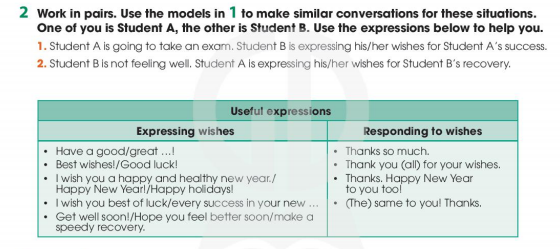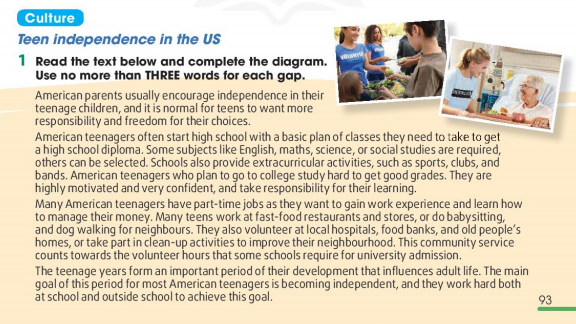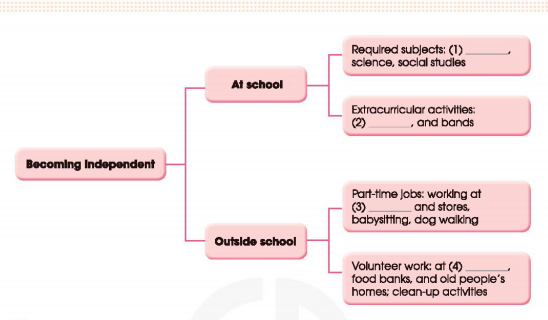Tiếng Anh 11 Global Success Unit 8 Communication and Culture/ CLIL
Tiếng Anh 11 Unit 8 Communication and Culture/ CLIL
Nằm trong bộ tài liệu Giải tiếng Anh 11 Kết nối tri thức theo từng Unit, Soạn tiếng Anh 11 Unit 8 Communication and Culture/ CLIL giúp các em chuẩn bị bài tập SGK tiếng Anh hiệu quả.
Tiếng Anh 11 Global Success Unit 8 Communication and Culture/ CLIL
Bản quyền thuộc về VnDoc nghiêm cấm mọi hành vi sao chép vì mục đích thương mại
Everyday English
Expressing best wishes and responding
(Thể hiện những lời chúc tốt đẹp và phản hồi)
1. Listen and complete the conversations with the expressions in the box. Then practise them in pairs.
(Nghe và hoàn thành các cuộc hội thoại với các biểu thức trong hộp. Sau đó thực hành chúng theo cặp.)
Bài nghe

Gợi ý đáp án
|
1. B |
2. D |
3. C |
4. A |
Hướng dẫn dịch
1.
Nam: Hey, I heard that you‘re going on a trip to Singapore tomorrow. (1) B. Have a great time!
(Này, tôi nghe nói rằng bạn sẽ có một chuyến đi đến Singapore vào ngày mai. Chúc bạn có một khoảng thời gian vui vẻ!)
Mike: Yep. (2) D. Thanks so much.
(Vâng. Cảm ơn rất nhiều.)
2.
Kevin: Hi, Mai. (3) C. Happy New Year! Wishing you a great year ahead!
(Chào Mai. Chúc mừng năm mới! Chúc bạn một năm tuyệt vời phía trước!)
Mai: Thanks, Kevin. (4) A. Same to you! Hope all your dreams come true!
(Cảm ơn, Kevin. Giống như bạn! Hy vọng tất cả những giấc mơ của bạn trở thành sự thật!)
2. Work in pairs. Use the models in 1 to make similar conversations for these situations. One of you is Student A, the other is Student B. Use the expressions below to help you.
(Làm việc theo cặp. Sử dụng các mô hình trong phần 1 để thực hiện các hội thoại tương tự cho các tình huống này. Một trong số các bạn là Học sinh A, người kia là Học sinh B. Sử dụng các biểu thức dưới đây để giúp bạn)

Gợi ý đáp án
1. A: Hi, I'm a bit nervous about the upcoming exam.
B: Don't worry, you got this! I know you've been studying hard and you're well-prepared. Good luck!
A: Thank you! I really appreciate your support.
B: No problem at all. Just do your best and everything will work out.
2. A: Hey, how are you feeling today?
B: Not too great, I'm feeling a bit sick.
A: I'm sorry to hear that. I hope you feel better soon.
B: Thanks, I appreciate it.
A: Is there anything I can do to help?
B: Just your kind words and good wishes are enough to make me feel better. Thank you.
Hướng dẫn dịch
1. A: Xin chào, tôi hơi lo lắng về kỳ thi sắp tới.
B: Đừng lo lắng, bạn có cái này! Tôi biết bạn đã học tập chăm chỉ và chuẩn bị tốt. Chúc may mắn!
Đáp: Cảm ơn bạn! Tôi thực sự đánh giá cao sự hỗ trợ của bạn.
B: Không có vấn đề gì cả. Chỉ cần cố gắng hết sức và mọi việc sẽ ổn thỏa.
2. A: Này, hôm nay bạn cảm thấy thế nào?
B: Không tuyệt lắm, tôi cảm thấy hơi mệt.
A: Tôi rất tiếc khi nghe điều đó. Tôi hy vọng bạn sẽ sớm cảm thấy tốt hơn.
B: Cảm ơn, tôi đánh giá cao nó.
A: Tôi có thể giúp gì được không?
B: Chỉ cần những lời tử tế và những lời chúc tốt đẹp của bạn cũng đủ khiến tôi cảm thấy dễ chịu hơn. Cảm ơn.
Culture
Teen independence in the US
(Sự tự lập của thanh thiếu niên ở Mỹ)
1. Read the text below and complete the diagram. Use no more than THREE words for each gap.
(Đọc đoạn văn dưới đây và hoàn thành sơ đồ. Sử dụng không quá BA từ cho mỗi chỗ trống.)


Gợi ý đáp án
1 - English
2 - sports, clubs
3 - fast-food, restaurants
4 - local hospitals
2. Work in groups. Discuss the following questions.
(Làm việc nhóm. Thảo luận các câu hỏi sau.)
Do American teenagers learn to become independent in the same way as Vietnamese teenagers? What are the similarities and differences?
(Thanh thiếu niên Mỹ có học cách tự lập giống như thanh thiếu niên Việt Nam không? Các điểm giống và khác nhau là gì?)
Gợi ý đáp án
In terms of similarities, both American and Vietnamese teenagers may seek to become more independent during their teenage years. They may also work part-time jobs or engage in community service activities.
In terms of differences, the cultural and educational contexts in which American and Vietnamese teenagers grow up can play a significant role in shaping their experiences and expectations for independence. For example, the emphasis on individualism in American culture may be different from the emphasis on collectivism in Vietnamese culture. Additionally, the education systems in the two countries may have different approaches to promoting independence and self-direction.
Ultimately, the ways in which American and Vietnamese teenagers learn to become independent may depend on a variety of factors, including cultural norms, family dynamics, education, and personal experiences.
Trên đây là Soạn tiếng Anh 11 Global Success Unit 8 Communication and Culture/ CLIL đầy đủ nhất.








